
The Partnership for Resilient Communities Oral Storytelling Project
By Partnership for Resilient Communities Oral Storytelling Project

The Partnership for Resilient Communities Oral Storytelling ProjectAug 16, 2022

(TRAILER) Partnership for Resilient Communities Oral Storytelling Project
Welcome to the Partnership for Resilient Communities Oral Storytelling Project!
In each episode, you will hear directly from movement leaders who are working to address the impacts of climate change and racial inequity on communities all across the U.S. Each will share in detail their on the ground approaches in the hopes that these stories may inspire and inform a new narrative that centers the true power of resilience.
• Episode #1- VIRGINIA ENVIRONMENTAL JUSTICE COLLABORATIVE: Queen Zakia Shabazz (Executive Director)
• Episode #2- CALIFORNIA INDIAN MUSEUM AND CULTURAL CENTER: Nicole Lim (Executive Director) & Carol Oliva (Program Specialist)
• Episode #3- HEALTHY COMMUNITY SERVICES: Dr. Angela Chalk (Healthy Community Services, Executive Director) & Cheryl Austin (Greater Treme Consortium, Executive Director)
• Episode #4- EASTSIDE COMMUNITY NETWORK: Donna Givens Davidson (Chief Executive Officer & President) Ricky Ackerman (Director of Climate Equity)
• Episode #5- WALNUT WAY CONSERVATION CORP.: Antonio Butts (Executive Director)
• Episode #6- POWER52 FOUNDATION: Cherie Brooks (President & Chief Executive Officer) & DeAndre Wiggins (Director of Workforce Development)
• Episode #7- GARFIELD PARK COMMUNITY COUNCIL: Mike Tomas (Executive Director) & Angela Taylor (Wellness Coordinator)
• Episode #8- LA MUJER OBRERA: Lorena Andrade (Executive Director) & Hilda Villegas (Community Organizer)
• Episode #9- ASIAN PACIFIC ENVIRONMENTAL NETWORK: Vivian Huang (Co-Director) & Dan Reilly (Ryse Commons, Director of Innovation)
• Episode #10- NOS QUEDAMOS/ WE STAY: Jessica Clemente (Chief Executive Director) & Ana Vincenty (Co-Founder & Office Administrator)
--------
Credits and Attribution
- Project Producer, Felicia T Perez
- Sound Producer, Vanessa Vancour
- Sound Editing Assistant, Escenthio Marigny
- Transcriptions, Dr. Lydia Huerta
- Illustration and Music, graceuarts
- Additional music credits (credits do not imply endorsement):
This storytelling series was developed through support from the Institute for Sustainable Communities.
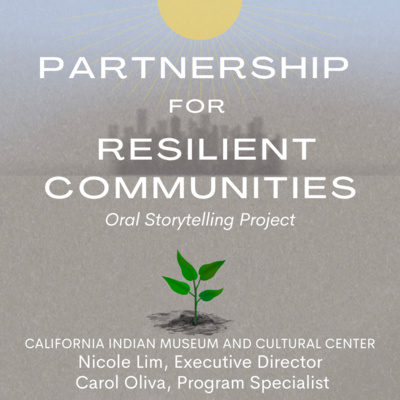
CALIFORNIA INDIAN MUSEUM AND CULTURAL CENTER (PRC Oral Storytelling Project)
In this episode listeners will hear from the Executive Director of the Virginia Environmental Justice Collaborative, Queen Zakia Shabazz, who will share about their work to address the impacts of climate change and racial inequity on communities in the state of Virginia.In this episode listeners will hear from the Executive Director of the California Indian Museum and Cultural Center, Nicole Lim, and Program Specialist Carol Oliva. Both will share about their work to address the impacts of climate change and racial inequity on communities in the state of California.
The California Indian Museum and Cultural Center (CIMCC) serves American Indians in Santa Rosa, CA. CIMCC created a community- participatory project to document climate vulnerabilities faced by Native peoples in Santa Rosa. CIMCC has developed and administered a community questionnaire about climate impacts and solutions, organized community meetings, analyzed information gathered, and created a report to share with community stakeholders. This report provides CIMCC with the information they need to advance the priorities of the Native community in Santa Rosa. Through the collected data, CIMCC evaluates how the community can reduce greenhouse gas emissions and reduce the impact of climate change. CIMCC integrates community needs into local planning by participation in policy design and development in Sonoma County. CIMCC also facilitates solar workshops within the Santa Rosa Native communities to explain the benefits and permits needed for solar panel installations to increase renewable electricity. Solar installations will allow residents to reduce their utility bills and provide a path forward to financial resilience and climate resilience during power outages, leading to the ability to stay cool during climate emergencies. CIMCC is a resilience hub and operates as an emergency shelter to the community during climate emergencies.

HEALTHY COMMUNITY SERVICES (PRC Oral Storytelling Project)
In this episode, listeners will hear from the Executive Director of Healthy Communities Services, Dr. Angela Chalk, and the Greater Treme Consortium Executive Director, Cheryl Austin.
In New Orleans, LA, many areas in the 7th Ward, 9th Ward, and Treme sit below sea level and have experienced many rain events that have led to water run-off and increased flooding impacts. In an example of community-based response, three community-based organizations partnered to address water run-off issues in the Treme, 7th Ward, and Upper 9th Ward. Healthy Community Services, Greater Treme Consortium, and Bunny Friend Neighborhood Association, with the support of Water Wise Gulf South, have created the Water Wise Neighborhood Champions (WWNC). WWNC is a program open to residents, business owners, and churchgoers who live in the impacted areas to learn about green infrastructure projects that increase resilience to climate change impacts through a three-step training program. Each area already has a WWNC completed green infrastructure vision plan: Treme (2017), 7th Ward (2018), and Upper 9th Ward (2019). At the end of the WWNC program, participants prioritize project implementation from each visioning session. WWNC uplifts resident priorities in planning to increase adaptability and resilience to climate impacts. Each neighborhood has one prioritized project pending implementation in partnership with the state of Louisiana, with the opportunity for community input during the design phase. Each stormwater management project will reduce flooding in vulnerable areas, including historically Black and Creole neighborhoods.
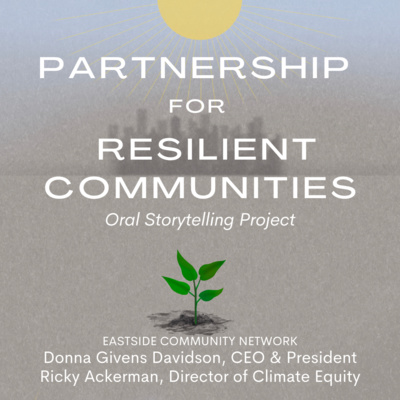
EASTSIDE COMMUNITY NETWORK (PRC Oral Storytelling Project)
In this episode, listeners will hear from the CEO & President of Eastside Community Network, Donna Givens Davidson, and the Director of Climate Equity, Ricky Ackerman.
In their community project, the Eastside Community Network (ECN) has identified the impacts of the urban heat island, increased precipitation, and lack of social cohesion in the Lower Eastside of Detroit, MIEastside Community Network (ECN) has identified the impacts of the urban heat island, increased precipitation, and lack of social cohesion in the Lower Eastside of Detroit, MI, in their community project. ECN identified neighborhood centers, also known as resilience hubs, to help residents during and after climate impacts. ECN is retrofitting a demonstration home with renewable energy (such as solar power and geothermal climate control), LEDs, low flow/flush plumbing (toilets and faucets), commercial kitchens, energy star appliances, and structures to collect and reuse rainwater, shared broadband, and community gardens. ECN also works with waste management through composting, which benefits community gardens and reduces waste going to landfills. The ECN resilience hubs will be networked throughout the Lower Eastside of Detroit by partnering with neighborhood leaders. These homes owned by residents will be retrofitted and open to the community during climate impacts. This exchange assists community members who volunteer their homes by updating and repairing various structures while reducing their environmental impact and utility bills. Through community storytelling, ECN will continue to share the benefits of climate resilience and the work that they have done with community members.

WALNUT WAY CONSERVATION CORP. (PRC Oral Storytelling Project)
In this episode, listeners will hear from the Executive Director of Walnut Way Conservation Corp., Antonio Butts.
Walnut Way Conservation Corp. (Walnut Way), located in the Lindsay Heights neighborhood of Milwaukee, WI, is a resident-led organization committed to sustaining an economically diverse community through civic engagement, environmental stewardship, and creating venues for prosperity. Most African American residents have experienced years of disinvestment in the area. Like many other cities in the United States, Milwaukee has a history of systemic racism in neighborhood planning and design. The impact of redlining (or established policies to keep neighborhoods segregated), urban renewal projects, and the lack of recent infrastructure investment have increased the community’s vulnerability to high amounts of precipitation, resulting in run-off and flooding. Walnut Way has started engaging Lindsay Heights residents in planning and designing community-embedded street and stormwater run-off diversion projects to mitigate urban flooding in Milwaukee’s combined sewer system. The project aims to divert water from the combined sewer system and help infrastructure handle high precipitation levels. Walnut Way’s green job training program, Blue Skies Landscaping, creates jobs and improves water quality in Lake Michigan and the Milwaukee River. In addition, Walnut Way has developed the Innovations and Wellness Commons, a community resilience hub complete with a roof-top garden and permeable patio, as well as a Bioswale adjacent to the Commons’ parking lot.
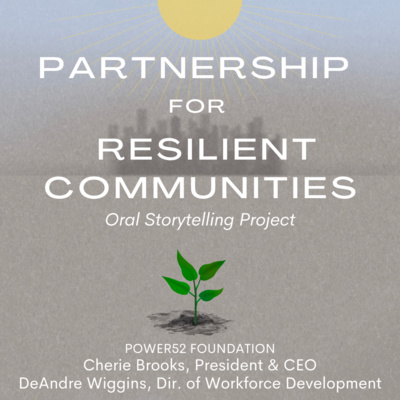
POWER52 FOUNDATION (PRC Oral Storytelling Project)
In this episode, listeners will hear from the President and CEO of Power52 Foundation, Cherie Brooks, and the Director of Workforce Development, DeAndre Wiggins.
Power52 Foundation (Power52) is an organization in Maryland that provides workforce development training and skills to historically disinvested communities for careers in Maryland’s clean energy sector. There are over 5,000 people employed in Maryland’s solar energy industry - more than their well-known crabbing industry. Recently, Maryland passed the Clean Energy Job Act to become 50% clean energy reliant by 2030 and forecasts 20,000 new jobs for residents. Power52 has ramped up its workforce development efforts so that residents in historically under-resourced communities are eligible for careers in the clean energy sector. Power52 launched Power52 Energy Institute Baltimore City (PEIBC), the first clean energy private career school in Maryland, approved by the Maryland Higher Education Commission (MHEC). PEIBC delivers the Energy Professional Training Program to residents of historically disinvested communities. Power52 has also opened a Power52 Energy Institute in Howard County to expand its service footprint. Since its founding, the Power52 Energy Institute has graduated 122 people with an 83% employment rate in Maryland’s clean energy industry. Many graduates are also ambassadors of equitable employment opportunities in the clean energy sector and role models in their communities. Power52 also works with communities to build out resilience hubs - community centers that residents can use during climate emergencies - in the communities they serve in partnership with Living Classrooms. The resilience hubs will offer disaster relief support to their communities. Power52 joined the Howard County Chamber of Commerce and the Long Reach Community Association to broaden its impact in Maryland.
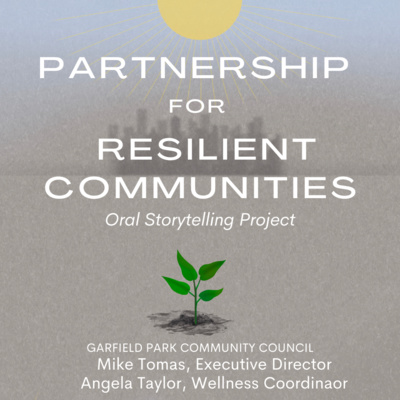
GARFIELD PARK COMMUNITY COUNCIL (PRC Oral Storytelling Project)
In this episode, listeners will hear from the Garfield Park Community Council Executive Director, Mike Tomas, Wellness Coordinator Garfield Park Community Council, Mike Tomas, and Wellness Coordinator Angela Taylor.
Garfield Park Community Council (GPCC) is a community-building organization comprised of residents and allies. GPCC is working to meet the needs stipulated by the West Side of Chicago: housing, wellness, business development, and resident leadership. GPCC integrates these priorities into planning efforts to increase the adaptability and resilience to climate impacts in Garfield Park. Based on community feedback, GPCC developed community garden networks to increase local food options in the neighborhood and increase community ownership of spaces. Building a network of community gardens will improve green infrastructure in the area and create the opportunity to increase the urban tree canopy - the number of trees in a given space. Both of these benefits reduce flooding from water run-off after heavy rain events and lower heat to reduce the impact of urban heat islands. GPCC educates community members on utilizing community gardens to increase environmental and social resilience, supporting the Supplemental Nutrition Assistance Program SNAP and other food justice initiatives. GPCC has started the Garfield Park Resilience Project. This project focuses on working with residents to build a resilient planning process to address climate impacts in Garfield Park. One of the main focuses is increasing community education on zoning, or how land is identified and used. GPCC continues to connect with residents to offer ownership in projects that reduce energy costs through renewable energy like community solar, increase access to affordable and green housing, and increase access to healthy foods. GPCC works as a bridge between residents, other organizations, and government officials in Chicago to help achieve the resilience plan that Garfield Park Community Council members have developed.
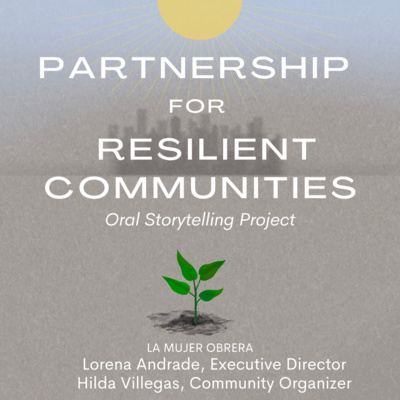
LA MUJER OBRERA (PRC Oral Storytelling Project)
In this episode, listeners will hear from the Executive Director of La Mujer Obrera, Lorena Andrade, and Community Organizer, Hilda Villegas.
La Mujer Obrera (LMO) is a local organization in El Paso, TX, specifically Chamizal, that works with residents to support economic development, community building, community health, and civic engagement. LMO approaches this support in a two-directional approach. Through Familias Unidas del Chamizal, LMO protects against discriminatory housing practices and supports residents with environmental health, housing, education, and essential quality of life. The other way that LMO works with the community is through Proyecto Verde. Proyecto Verde works to build community knowledge through ancestral food traditions. LMO is currently working on building climate resilience in its programming and community projects. In partnership with academic experts and community members, LMO developed an action-oriented planning process for community climate resilience. The process started with an assessment of neighborhood assets (both infrastructure and community knowledge). LMO will collaborate with experts to build a green infrastructure and emergency preparedness plans. All of this work culminates with the Chamizal Climate Resilience Planning Summit. All information from the Summit will ultimately help inform the Chamizal Community Plan for Climate Resilience.
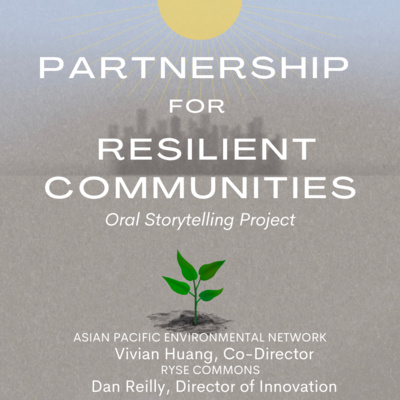
ASIAN PACIFIC ENVIRONMENTAL NETWORK (PRC Oral Storytelling Project)
In this episode, listeners will hear from the Co-Director of the Asian Pacific Environmental Network, Vivian Huang, and the Ryse Commons Director of Innovation, Dan Reilly.
The Asian Pacific Environmental Network (APEN) in Oakland, CA, builds resilient communities that promptly recover from flooding, air pollution, and heatwaves. The work that APEN is completing will create communities that can adapt to new climate situations and prepare for an unpredictable climate future. APEN identified sites for solar installation in Oakland and Richmond to develop community solar resilience hubs and increase the amount of renewable energy generated for use. Increasing renewable energy will decrease the risk of electricity shutoffs, reduce utility bills, and decrease the greenhouse gases released for electricity generation. The Richmond site is in partnership with RYSE, and the Oakland site with Asian Health Services and Lincoln Elementary School. APEN is empowering local youth to design the community facilities to sustainably meet the needs of residents before, during, and after climate impacts. These resilience hubs will create more resilient communities with renewable energy added to the grid and build climate resilience, emergency preparedness, and social resilience.

NOS QUEDAMOS/ WE STAY (PRC Oral Storytelling Project)
In this episode, listeners will hear from the Chief Executive Director of Nos Quedamos/We Stay, Jessica Clemente, and Co-Founder Ana Vicenty.
Through engagement, Nos Quedamos (NQ) discovered that one of the community’s priorities is establishing 12 community gardens. The community gardens will be a source of local healthy food and a safe place where residents can gather and build community. NQ partnered with community members to plan the community garden network and leverage existing gardens into a community-wide system of open spaces. Infrastructure goals with the gardens include solar panels, rainwater harvesting, and wi-fi access to improve environmental impacts and encourage occupancy in the garden sites. Other resources NQ provides include job training, climate resilience leadership, and increased environmental education. In response to the COVID-19 pandemic, NQ developed a community needs survey to update their understanding of community needs. NQ will integrate the survey responses into their projects moving forward, which is a perfect example of responsive engagement.
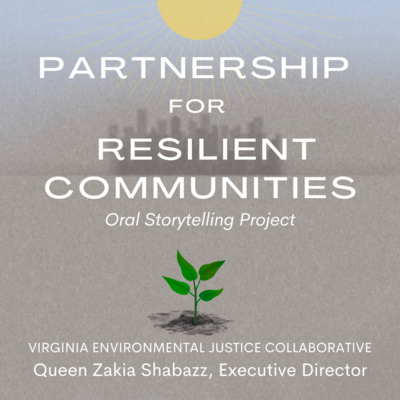
VIRGINIA ENVIRONMENTAL JUSTICE COLLABORATIVE (PRC Oral Storytelling Project)
In this episode listeners will hear from the Executive Director of the Virginia Environmental Justice Collaborative, Queen Zakia Shabazz, who will share about their work to address the impacts of climate change and racial inequity on communities in the state of Virginia.
The Virginia Environmental Justice Collaborative (VEJC) supports frontline communities to address environmental justice issues. VEJC has converted the Beaux Twenty (a historic building) into a community solar resilience hub in The Heights community in Petersburg, VA. The resilience hub will be powered by solar energy through the placement of solar panels. The solar resilience hub is located in the center of The Heights and is accessible to many community members. In partnership with United Parents Against Lead (UPAL) and Morua Power, the Beaux Twenty Solar Resilience Hub will become a capacity-building opportunity for residents of The Heights and function as an emergency response center during climate impacts. VEJC will continue to work with UPAL, Morua Power, The Heights Civic Association, and the city of Petersburg to build out the solar resilience hub to continue to meet the needs and priorities of the residents of The Heights. Some of these priorities include food justice, multi-generational collaboration, and general community resilience. The solar resilience hub will have a kitchen/dining area open to community members and offer dietician programming, serving, and short-order cook opportunities.